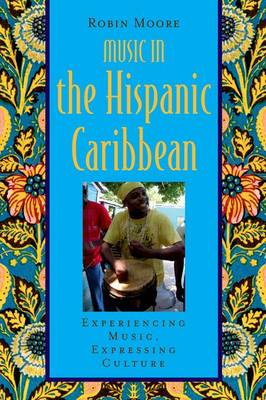GLOBAL MUSIC
1 total work
Music in the Hispanic Caribbean is one of several case-study volumes that can be used along with Thinking Musically, the core book in the Global Music Series. Thinking Musically incorporates music from many diverse cultures and establishes the framework for exploring the practice of music around the world. It sets the stage for an array of case-study volumes, each of which
focuses on a single area of the world. Each case study uses the contemporary musical situation as a point of departure, covering historical information and traditions as they relate to the present.**
The Spanish-speaking islands of Cuba, Puerto Rico, and the Dominican Republic make up a relatively small region, but their musical and cultural traditions have had a dramatic, sweeping impact on the world. The first brief, stand-alone volume to explore the music of these three islands, Music in the Hispanic Caribbean provides a vibrant introduction to diverse musical styles including salsa, merengue, reggaeton, plena, Latin jazz, and the bolero.
Ethnomusicologist Robin Moore employs three themes in his survey of Hispanic Caribbean music:
- The cultural legacy of the slave trade
- The creolization of Caribbean musical styles
- Diaspora, migration, and movement
Each theme lends itself to a discussion of the region's traditional musical genres as well as its more contemporary forms. The author draws on his extensive regional fieldwork, offering accounts of local performances, interviews with key performers, and vivid illustrations.
A compelling, comprehensive review, Music in the Hispanic Caribbean is ideal for introductory undergraduate courses in world music or ethnomusicology and for upper-level courses on Caribbean and Latin American music and/or culture.
Packaged with a 70-minute CD containing musical examples, the text features numerous listening activities that actively engage students with the music. The companion website (www.oup.com/us/globalmusic) includes supplementary materials for instructors.
focuses on a single area of the world. Each case study uses the contemporary musical situation as a point of departure, covering historical information and traditions as they relate to the present.**
The Spanish-speaking islands of Cuba, Puerto Rico, and the Dominican Republic make up a relatively small region, but their musical and cultural traditions have had a dramatic, sweeping impact on the world. The first brief, stand-alone volume to explore the music of these three islands, Music in the Hispanic Caribbean provides a vibrant introduction to diverse musical styles including salsa, merengue, reggaeton, plena, Latin jazz, and the bolero.
Ethnomusicologist Robin Moore employs three themes in his survey of Hispanic Caribbean music:
- The cultural legacy of the slave trade
- The creolization of Caribbean musical styles
- Diaspora, migration, and movement
Each theme lends itself to a discussion of the region's traditional musical genres as well as its more contemporary forms. The author draws on his extensive regional fieldwork, offering accounts of local performances, interviews with key performers, and vivid illustrations.
A compelling, comprehensive review, Music in the Hispanic Caribbean is ideal for introductory undergraduate courses in world music or ethnomusicology and for upper-level courses on Caribbean and Latin American music and/or culture.
Packaged with a 70-minute CD containing musical examples, the text features numerous listening activities that actively engage students with the music. The companion website (www.oup.com/us/globalmusic) includes supplementary materials for instructors.
